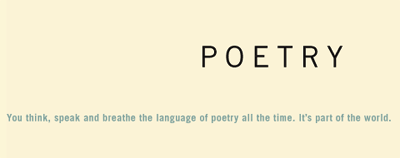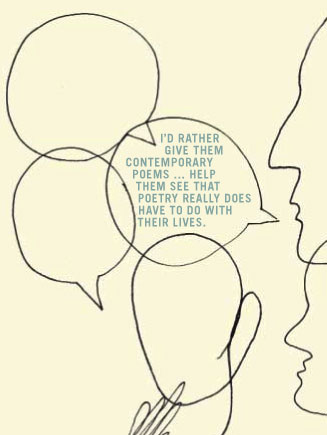
A creative writing teacher and English lecturer for 19 years, Cindy Nichols has long battled the notion that poetry is highbrow and inaccessible. She recently published an article with the weighty title, "Down in the Body in the Undergraduate Poetry Course: Thoughts on Bakhtin, Hypertext and Cheap Wigs." The subject matter is equally weighty: What can teachers do to transform poetry's image from a source of fear and loathing to a meaningful genre that truly engages the soul? In pursuit of the answer, Nichols has encouraged her classes to try techniques less ordinary. Her students have performed poems with props, and scribbled poetry in chalk on the sidewalks outside. "And, sometimes, I even ask students to sit quietly and read," she says. Here, Nichols shares her written thoughts on the literary form, and why it's worth reassessing.
Q. What are the particular challenges of teaching poetry today? Do you believe fewer people are attempting to understand and enjoy poetry than in the past?
A. I think it's fairly evident that, yeah, poetry is a marginalized genre in mainstream America. Even in its most popular forms, it simply doesn't sell the way that other genres do, the average person on the street doesn't appear to seek it out, and the great mass of my younger students have long reported feeling uneasy, dumb, indifferent, or occasionally even hostile to it. Lyric poems tend to invite a lingering, concentrated attention to the way that words mean and feel, and this of course is not at all the kind of attention invited by most mass media, whose bombardment of disparate and shrill messages prompts something like stupefaction. I mean, we just can't sit there on our couches and watch a car bombing full of body parts and screaming children one second and a Viagra commercial featuring Bob Dole the next without overwhelming whatever faculty it is in our hearts and psyches that responds to lyric poetry.
On the other hand, it's quite possible that poetry is no more marginalized now than at any other time in this country. (I've recently been researching manuals and school texts from the early 20th century, and it's amazing how closely student attitudes and teacher frustrations resemble those today.) In the late 1980s we saw the revival of Beat-style slam and performed poetry, with a whole surge of anthologies coming out full of "poetry for the people." It's almost like, as the noise of the world gets more dense and caustic, the louder poetry's voice must grow to counter it or absorb it. And who knows - from the perspective of a poet, maybe car bombings and Viagra have a hell of a lot in common.
Likewise, students are clamoring to get into MFA programs in poetry all over the country, and there is absolutely no shortage of small press poetry publications in all styles and schools. I believe that people will always be engaged by aesthetic uses of language. We're hungry for it. If our world changes, if we're all afflicted with TV psychosis, poetry doesn't go away; it simply changes along with everything else.
Q. Why are so many of us intimidated by poetry?
A. One big problem I see is the "academization" of poetry. Kids just love language patterns, textures and rhythms, they dig even how words and letters look. But somewhere along the line that pleasure is converted into distrust. Analyzing individual poems in the New Critical fashion, at least in the earlier grades, I think is extremely counter-productive. They learn that poetry is some sort of maliciously tricky genre imposed on them in the classroom, some kind of secret code they have to break to please a teacher. There's nothing at all wrong with various kinds of study, but I think it should come after kids have already gained a foundation of pleasure and trust - much as they do with music.
Another problem is maybe the sheer number of poetry types. Really, the word "poetry" is just entirely insufficient for what falls under that rubric. A plain-spoken narrative poem may have a setting, plot and characters just like many prose stories, but a really compressed, elliptical and hermetic lyric poem may be in a disembodied voice in no identifiable landscape using extreme associative or disjunctive logic. Some poems use space on the page for rhythmic or rhetorical effects, some are written to undermine every preconceived idea anyone has about what a poem is supposed to be, some are written with no apparent purpose but to make end rhymes work. I think a lot of us have been bottle-fed by teachers or popular culture on a single kind of "poetry," and then are thrown when we encounter something which doesn't fit that type.
In any case, I try to help my students with this by putting any given work in a literary, cultural and social context. On one hand, I try to demystify poetry - help students see that yeah, absolutely, they CAN understand it, it isn't written by Martians or the CIA, and, on the other hand, help them see that no one exactly knows what in the world this stuff really is. It's open and in flux, it's material for play, it's still ultimately mysterious even to the people who write it and write it well.

Q. What are things you've done to help students better understand poetry?
A. Well, I'm very big on having students at any level actually WRITE poems as a form of "study." I think it's one of the best ways for students to gain confidence and to show (and learn) how much they already intuitively know. I think that by writing poems students shake off some of the critical baggage they've accumulated in school and begin to remember poetry's "genre knowledge," its unique way of making meaning.
I'm also fond of distraction and disruption as teaching techniques. Negative attitudes have sometimes already hardened by the time students reach college, so I like to do something unexpected in the classroom to kind of weasel them out of it. I'll have them go outside and eat snow, or type at a word processor with their monitors off, or write a collaborative poem or a speed poem, and so on. Sometimes those things help, sometimes not. But I hope my students at least leave the classroom thinking more about the creative possibilities of poetry than about how weird it is or how much they don't "get" it.
It's incredibly important to give students poems that matter to them and speak to them. For the most part, at certain points in their education, I think it's harmful to assign work which is centuries old, in an alien form of English (or an alien form of whatever their native language may be). I think this was possibly a problem even back in the first half of the 1900s, based on my reading of teachers' manuals and textbooks. Such a tactic just encourages students' belief that poetry is language that requires, first and foremost, purely rational and sometimes arcane decoding, that it has nothing to do with sensuous and intuitive pleasure.
I'd rather give them contemporary poems in the language they use everyday, help them see that poetry really does have to do with their lives. Once that foundation is established, they might be more receptive to classics. Once they're trusting and curious, they'll see that "translating" older material is just a necessary step to accessing the fabulous, screwed-up, weirdly familiar lives and minds of their own whack-job ancestors.
Q. You make many references to helping students write and read poetry "dialogically." What do you mean by that?
A. Maybe the word "conversational" is really enough. What I try to do is bring students into contact with a poem in a way that requires engaged openness. I don't want them observing poems, even though that can certainly be interesting. I want them to respond in kind; carry on a dialogue with a poem in its own language. I'm advocating, in other words, something like study by creative response rather than study by critical analysis.
My feeling in the classroom is: come on, you know you can do this. You think, speak and breathe the language of poetry all the time. It's part of the world. It's in Burger King commercials. It's in the language of your favorite sports newscaster, the wry crack of a dopey uncle, the line of a song that rips you to shreds. Write a poem in response to the poem. Talk back to the poet. Speak "poetry." Listen for the lower note, the odd resonance, the oblique meaning. Just don't be a provincial and arrogant tourist (critic, theorist, scholar, student) who reads the guidebook, however long and hard, however 'intelligently,' takes a snapshot, and gets back on the bus.

































